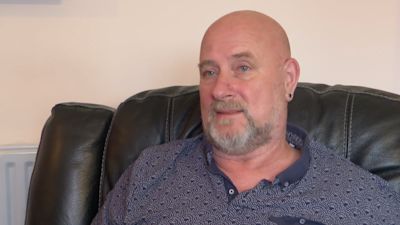Man says he was left in agony during nine-hour wait for ambulance

Watch Ken Goodwin's report
A man who fell and hit his head says he was left in agony during an almost nine-hour wait for an ambulance.
Kevin Toogood, from Lydbrook in the Forest of Dean, told ITV News he was knocked out after falling in his driveway.
"Hitting my back and my head, I realised I was in a lot of pain," he said.
"I tried to get back up but I couldn't. I just fell straight back down and the next thing I knew one of my neighbours was rubbing my back, so it must've knocked me out.
An ambulance was called at 11.46am - but crews did not arrive to help Kevin until almost nine hours later, at 8.25pm.
"I was knocked out with a head injury and back injury. It took nine hours for somebody to get out to me," Kevin told ITV News.
The ambulance service says it is under "severe pressure" and experiencing the highest-ever level of sustained demand. In a statement, it apologised to patients who have experienced long waits.
When Kevin did arrive at Gloucestershire Royal, he waited a further 10 hours to be seen by a doctor.
The hospital has since apologised for the wait and says an investigation is underway.
Kevin is used to being in pain. He has had five operations on his back following an injury and now struggles to get around.
He now has an implant to help ease his symptoms - but said the fall was the worst pain he has ever felt.
His wife, Lynne Toogood, said he would "cry out" in pain every time he moved after the fall.
"He wasn't comfortable sitting, he wouldn't stand, he couldn't get up - he was in pain, he just couldn't do anything," she said.
On the night Kevin was injured, he says call handlers told him they were incredibly busy.
"They said that everybody that was available to them was out... It was just unbelievable," he said.
"I think it's absolutely disgusting they need to do something about that - I could've died," he said.
Once he arrived at Gloucestershire Royal Hospital, Kevin claims it took 10 hours for him to be seen by a doctor.
"I was crying in pain, I've never experienced pain like it - it shouldn't be (like that).
"I know they say they're short, but when they can see somebody is in that much pain, you shouldn't have to (wait)."
What has the hospital said?
In a statement issued to ITV News, Gloucestershire Royal's medical director and deputy chief executive, professor Mark Pietroni, apologised and said the incident is under investigation.
He said: “We are very sorry that Mr Toogood was unhappy with the care he received at our hospitals and in particular, we apologise for the distress caused by a long wait in our emergency department at Gloucestershire Royal Hospital."
He said the hospital is experiencing "very high levels" of demand as well as a "sudden influx" of very unwell patients which results in longer wait times for others."
“On occasion, some patients will therefore wait longer than we would like," he added.
"Our aim in these circumstances is to ensure that they remain well cared for, understand the reasons for the delay and are treated then admitted or discharged as quickly as possible.
“We are always extremely concerned when we hear of any experiences that fall below the high standards that every patient has the right to expect.'
He said the Mr Toogood's experience is under investigation by the hospital's patient advice and liaison team.
What has the ambulance service said?
A South Western Ambulance Service NHS Foundation Trust (SWASFT) spokseperson said: “We are sorry some patients are having to wait longer for an ambulance because of hospital handover delays, which are a result of NHS services being under severe pressure.
“We continue to experience the highest-ever level of sustained demand on our service, and are dealing with a new 999 incident every 29 seconds.
“Our response times are directly affected by the time it takes us to handover patients into busy hospital emergency departments, which is longer than we have ever seen before."
The spokesperson said the service lost 900 hours in one day alone - on Tuesday 19 October - to handover delays. It says two years ago, it lost just 400 hours in an average week.
"Having 30% of our ambulances queuing outside hospitals and unable to respond to other patients has an inevitable impact on the service we can provide," they added.
“It is an absolute priority for us and our NHS partners to find a solution to this system problem, so we can be there for our patients and prioritise those who are most seriously injured and ill.”